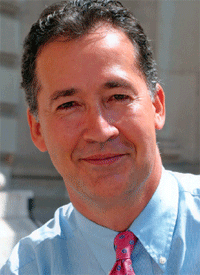Burma at a Crossroads
Newly Appointed British Ambassador Mark Canning Looks at UK-Burma Relations
Mark Canning was appointed British Ambassador to Burma in July 2006. He previously served as deputy high commissioner in Kuala Lumpur and first secretary in Jakarta. Other postings with the Foreign and Commonwealth Office include service in the US and in the UK’s Counter Terrorism Department. The Irrawaddy talks with Canning on issues including the UN-Burma standoff, the democratic opposition and the importance of a two-way flow of information with the Burmese junta.
Question: Soon after taking up your post in Rangoon, Burma’s state-run press accused you of violating diplomatic procedure by making contact with the National League for Democracy. Has this episode affected how you would engage with the Burmese opposition?
Answer: It’s a central part of the job to keep in touch with a range of opinion, as the Vienna Convention [on Diplomatic Relations, 1961] makes clear. The circumstances under which we work inevitably mean that some discussions tend to attract rather more attention than others, but it’s important to recognize that the National League for Democracy is part of the political fabric of this country, and we value our contacts with them. 
Q: What do you hope to achieve during your tenure as ambassador in Rangoon?
A: Burma is clearly at a crossroads. In one direction lies international isolation, and in the other, a more constructive relationship with the international community. Recent events have been disappointing—the relationship with the International Labour Organization is in crisis, and Burma faces possible referral to the International Court of Justice. The International Committee of the Red Cross has been ordered to close most of its operations, and a further crackdown on the opposition is in progress. But as (UN Under Secretary-General Ibrahim) Gambari told the Security Council recently, the UN remains committed to playing a role in helping Burma forge a better relationship with the international community and a meaningful process of internal reconciliation.
Members of the Security Council—including the UK—made clear they want this process to work.
For the moment, the ball is entirely in the SPDC’s [State Peace and Development Council] court. But it’s not too late to change direction, and my hope is that during my time here, there will be genuine forward movement and a greater opportunity for the people of this country to enjoy the sort of benefits their Asean neighbors take for granted. We will do all we can to support this, and the European Union has made clear it will respond proportionately to movement in a positive direction.
Q: How would you describe your working relationship with the Burmese government thus far?
A: I have been received with great courtesy at all levels, and have been able to meet with a range of senior people. There’s no doubt the move to Naypyidaw complicates the task of developing the sort of less formal dialogue that’s so important if misunderstandings are to be avoided, and one occasionally wonders just how accurate a picture of things finds its way up the chain. I hope, though, that an improved two-way flow of information will steadily start to evolve, which will benefit both parties. We already have excellent exchanges, for example, on healthcare and education.
Q: Obviously, the opposition are in a weak position given government efforts to marginalize them. How would you assess their current state and their opportunities to move forward?
A: In my short time here I have met many brave and committed individuals within what you might call the “opposition.” Obviously, their viewpoints differ to a degree, but the thing that binds them all together is a love for their country and a belief they can bring improvement. That sort of passion and commitment needs to be harnessed, not rejected. As things stand, the opposition is in a weak position, but that’s hardly surprising given the pressures they are under. Achieving political progress will depend on all sides working together, but most of all, as Mr Gambari stressed, on the process becoming more open and inclusive.
Q: The UK is currently the second largest source of investment in Burma—a major point of contention for opposition groups.
1 | 2 next page »
